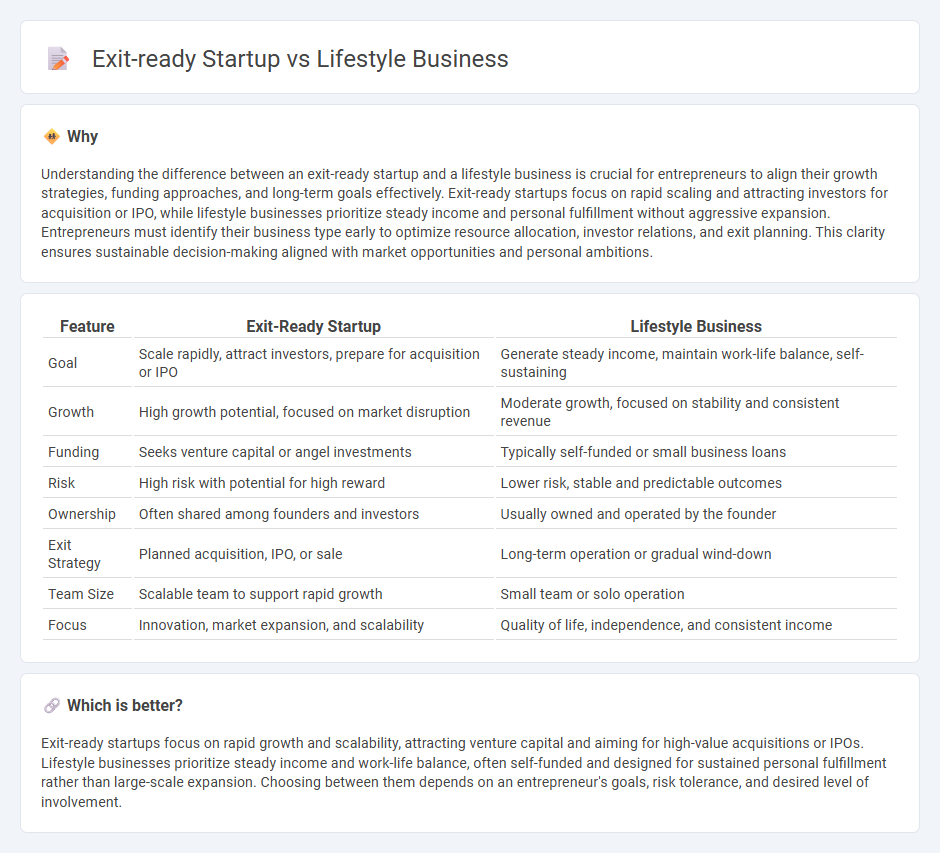
Exit-ready startups focus on rapid growth, scalable business models, and attracting venture capital to achieve significant market valuation for a profitable acquisition or IPO. Lifestyle businesses emphasize steady revenue streams, personal fulfillment, and sustainable work-life balance without aggressive expansion goals. Discover the key differences and strategic decisions shaping your entrepreneurial path.
Why it is important
Understanding the difference between an exit-ready startup and a lifestyle business is crucial for entrepreneurs to align their growth strategies, funding approaches, and long-term goals effectively. Exit-ready startups focus on rapid scaling and attracting investors for acquisition or IPO, while lifestyle businesses prioritize steady income and personal fulfillment without aggressive expansion. Entrepreneurs must identify their business type early to optimize resource allocation, investor relations, and exit planning. This clarity ensures sustainable decision-making aligned with market opportunities and personal ambitions.
Comparison Table
| Feature | Exit-Ready Startup | Lifestyle Business |
|---|---|---|
| Goal | Scale rapidly, attract investors, prepare for acquisition or IPO | Generate steady income, maintain work-life balance, self-sustaining |
| Growth | High growth potential, focused on market disruption | Moderate growth, focused on stability and consistent revenue |
| Funding | Seeks venture capital or angel investments | Typically self-funded or small business loans |
| Risk | High risk with potential for high reward | Lower risk, stable and predictable outcomes |
| Ownership | Often shared among founders and investors | Usually owned and operated by the founder |
| Exit Strategy | Planned acquisition, IPO, or sale | Long-term operation or gradual wind-down |
| Team Size | Scalable team to support rapid growth | Small team or solo operation |
| Focus | Innovation, market expansion, and scalability | Quality of life, independence, and consistent income |
Which is better?
Exit-ready startups focus on rapid growth and scalability, attracting venture capital and aiming for high-value acquisitions or IPOs. Lifestyle businesses prioritize steady income and work-life balance, often self-funded and designed for sustained personal fulfillment rather than large-scale expansion. Choosing between them depends on an entrepreneur's goals, risk tolerance, and desired level of involvement.
Connection
Exit-ready startups focus on rapid growth, scalability, and attracting investors to achieve lucrative acquisitions or IPOs, while lifestyle businesses prioritize sustainable income and personal fulfillment over aggressive expansion. Both models require strategic planning, financial management, and market understanding, but differ in growth ambitions and exit strategies. Entrepreneurs often assess their risk tolerance and long-term goals to decide between building an exit-ready startup or a lifestyle business.
Key Terms
Growth potential
Lifestyle businesses prioritize steady income and personal fulfillment, often operating within niche markets with limited scalability. Exit-ready startups target rapid growth through scalable business models, aiming for high valuations and substantial market capture to attract investors or acquirers. Explore detailed strategies to balance growth potential with long-term business goals.
Scalability
Lifestyle businesses often prioritize steady revenue and personal control, targeting niche markets with limited scalability. Exit-ready startups emphasize rapid growth, market disruption, and scalability to attract investors and achieve high valuations. Explore key strategies to scale your business effectively and understand which approach aligns with your goals.
Founder goals
A lifestyle business prioritizes steady revenue and personal freedom, aligning closely with a founder's desire for work-life balance and sustainable income without aggressive growth. In contrast, an exit-ready startup targets rapid scaling, market disruption, and maximizing valuation to attract investors and enable lucrative exits such as acquisitions or IPOs. Explore in-depth strategies to align business models with founder goals and optimize success outcomes.
Source and External Links
What is a Lifestyle Business and How to Start One - Shopify - A lifestyle business is typically internet-first, designed to make enough profit to allow the entrepreneur to work and live from anywhere, often selling digital goods, software, or providing virtual services, with examples including digital courses, freelancing, or dropshipping.
Lifestyle business - Wikipedia - A lifestyle business is established primarily to maintain or achieve a desired lifestyle for its founder, focusing on flexibility and personal fulfillment rather than growth, typically operated by the founders themselves without aiming for scalability or attracting professional investors.
8 Lifestyle Business Ideas to Start in 2024 - Shopify - Lifestyle businesses enable earning money while living life on one's own terms, often with low startup costs and flexible schedules, including ideas such as creating digital products, freelancing, consulting, or becoming an influencer.
 dowidth.com
dowidth.com